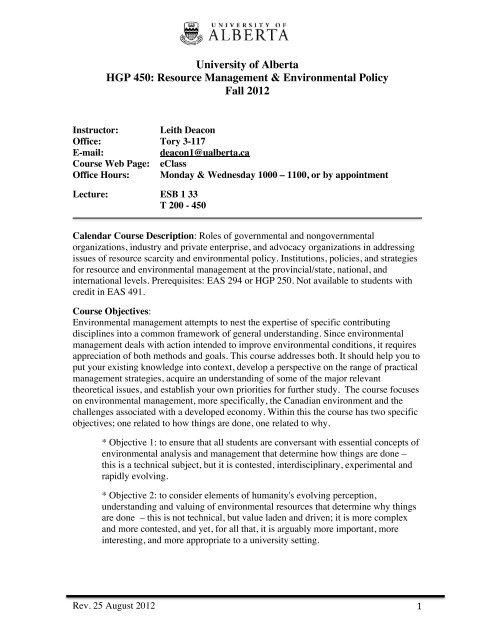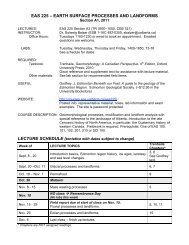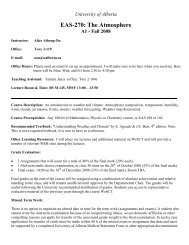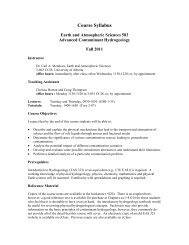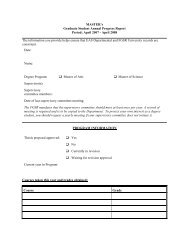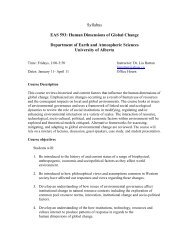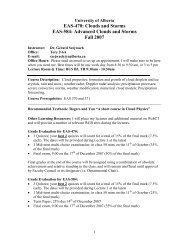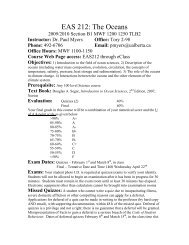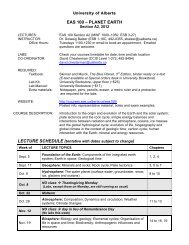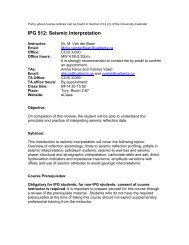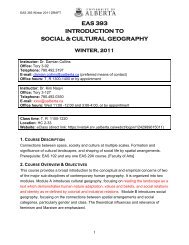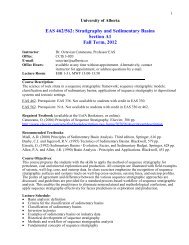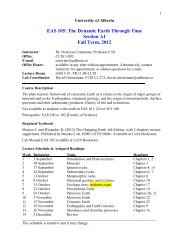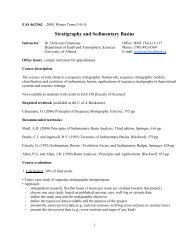HGP 450 Course Outline - University of Alberta
HGP 450 Course Outline - University of Alberta
HGP 450 Course Outline - University of Alberta
You also want an ePaper? Increase the reach of your titles
YUMPU automatically turns print PDFs into web optimized ePapers that Google loves.
<strong>University</strong> <strong>of</strong> <strong>Alberta</strong><strong>HGP</strong> <strong>450</strong>: Resource Management & Environmental PolicyFall 2012Instructor: Leith DeaconOffice: Tory 3-117E-mail:deacon1@ualberta.ca<strong>Course</strong> Web Page: eClassOffice Hours: Monday & Wednesday 1000 – 1100, or by appointmentLecture: ESB 1 33T 200 - <strong>450</strong>Calendar <strong>Course</strong> Description: Roles <strong>of</strong> governmental and nongovernmentalorganizations, industry and private enterprise, and advocacy organizations in addressingissues <strong>of</strong> resource scarcity and environmental policy. Institutions, policies, and strategiesfor resource and environmental management at the provincial/state, national, andinternational levels. Prerequisites: EAS 294 or <strong>HGP</strong> 250. Not available to students withcredit in EAS 491.<strong>Course</strong> Objectives:Environmental management attempts to nest the expertise <strong>of</strong> specific contributingdisciplines into a common framework <strong>of</strong> general understanding. Since environmentalmanagement deals with action intended to improve environmental conditions, it requiresappreciation <strong>of</strong> both methods and goals. This course addresses both. It should help you toput your existing knowledge into context, develop a perspective on the range <strong>of</strong> practicalmanagement strategies, acquire an understanding <strong>of</strong> some <strong>of</strong> the major relevanttheoretical issues, and establish your own priorities for further study. The course focuseson environmental management, more specifically, the Canadian environment and thechallenges associated with a developed economy. Within this the course has two specificobjectives; one related to how things are done, one related to why.* Objective 1: to ensure that all students are conversant with essential concepts <strong>of</strong>environmental analysis and management that determine how things are done –this is a technical subject, but it is contested, interdisciplinary, experimental andrapidly evolving.* Objective 2: to consider elements <strong>of</strong> humanity's evolving perception,understanding and valuing <strong>of</strong> environmental resources that determine why thingsare done – this is not technical, but value laden and driven; it is more complexand more contested, and yet, for all that, it is arguably more important, moreinteresting, and more appropriate to a university setting.Rev. 25 August 2012 1
Required Textbook:Mitchell, Bruce (2010). Resource and Environmental Management in Canada:Addressing Conflict and Uncertainty 4/e. OUP<strong>Course</strong> Schedule:Week Date Unit ReadingOne Sept. 11 Introduction, Organization Introduction, 1Two Sept. 18 Framework for the management <strong>of</strong> natural 15, 17resourcesThree Sept. 25 Commons, rights <strong>of</strong> access, co-management, 2, 4, 18, 19governance, global forcesFour Oct. 2 Inventory, stock assessment and productivity 3Five Oct. 9 TEST #1Six Oct. 16 Sustaining yields and ecosystems: fisheries8managementSeven Oct. 23 Nested jurisdictions: wetland management7and trans boundary resource managementEight Oct. 30 Managing mobile resources: wildlife 11Nine Nov. 6 Exploiting non-renewables and regenerating 13functional landTen Nov. 13 NO CLASSEleven Nov. 20 TEST #2 (first half)Multiple and integrated use <strong>of</strong> resources:6, 10forest and water powerTwelve Nov. 27 Adapting to surprise: climate change, spills 5, 14, 16, 20and agricultural stewardshipThirteen Dec. 4 Student presentations and exam reviewEvaluation and Grading:All assignments and examinations in this course will be given a numerical score. Acumulative course mark will be calculated from those scores, weighted as tabulatedbelow. A final letter grade will be assigned based upon your cumulative mark and myanalysis <strong>of</strong> the class’s cumulative mark distribution. Where possible, natural breaks in thecumulative mark distribution will be used in assigning grades, but no pre-determineddistribution <strong>of</strong> grades will be imposed on the class. Your grade will reflect a combination<strong>of</strong> your absolute achievement and relative standing in the class.Rev. 25 August 2012 2
participation in an <strong>of</strong>fence. Academic dishonesty is a serious <strong>of</strong>fence and can resultin suspension or expulsion from the <strong>University</strong>.’All forms <strong>of</strong> dishonesty are unacceptable at the <strong>University</strong>. Cheating, plagiarismand misrepresentation <strong>of</strong> facts are serious <strong>of</strong>fenses. Anyone who engages in thesepractices will receive at minimum a grade <strong>of</strong> zero for the exam or paper in question andno opportunity will be given to replace the grade or redistribute the weights. Any <strong>of</strong>fensewill be reported to the appropriate Dean, who will determine the disciplinary action to betaken. Typical sanctions for serious violations <strong>of</strong> the Code have included disciplinarygrade reductions, disciplinary failing grades, suspension or permanent expulsion from the<strong>University</strong>.EXAMS: Your student photo I.D. is required at exams to verify your identity. Studentswill not be allowed to begin an examination after it has been in progress for 30 minutes.Students must remain in the exam room for at least 30 minutes from the time the examcommenced. Electronic equipment is not to be brought to exams.CELL PHONES: Please turn <strong>of</strong>f cell phone during lectures. Cell phones are not to be inyour possession during exams; leave it home or put it away in your backpack.STUDENTS WITH DISABILITIES: Students who require accommodation in thiscourse because <strong>of</strong> a disability are advised to discuss their needs with Specialized Support& Disability Services (2-800 Students’ Union Building).STUDENT SUCCESS CENTRE: Students who require additional help in developingstrategies for better time management, study skills or examination skills should contactthe Student Success Centre (2-300 Students’ Union Building).RECORDING: “Audio or video recording <strong>of</strong> lectures, labs, seminars or any otherteaching environment by students is allowed only with the prior written consent <strong>of</strong> theinstructor or as a part <strong>of</strong> an approved accommodation plan. Recorded material is to beused solely for personal study, and is not to be used or distributed for any other purposewithout prior written consent from the instructor.” [Calendar 23.4(2)e.]COURSE OUTLINE POLICY: “Policy about course outlines can be found in section23.4(2) <strong>of</strong> the <strong>University</strong> Calendar.” [Calendar 23.4(2)a.xi]Disclaimer: Any typographical errors in this <strong>Course</strong> <strong>Outline</strong> are subject to change andwill be announced in class. The date <strong>of</strong> the final examination is set by the Registrar andtakes precedence over the final examination date reported in this syllabus.Rev. 25 August 2012 4


